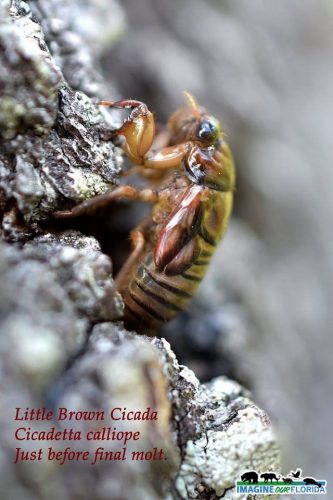Cicadas are some pretty neat little creatures that are all around us but go largely unseen. They do not, however, go unheard. I bet, at some point, just about everyone has heard these guys screaming from the treetops at some point in their lives. But did you know that most of their lives are spent underground?
The species in the photos are of the Little Brown Cicada (Cicadetta calliope) or Grass Cicada. This is a small species of cicada, growing to just under 1 inch in size. Unlike its larger cousins to the north, this is not a periodical cicada. Those cicadas emerge every 13 to 17 years in numbers as great as 1.5 million per acre. For our residents who hail from the northeast, Florida has no periodical species. The closest location to observe the emergence of periodical species would be one of the 13-year varieties. Southeastern Louisiana will have its next emergence in 2027, and in central Alabama and Georgia, the next emergence will be in 2024.
So, some cool facts on these amazing insects. We all know their sound, but did you know only the males actually make noise. Cicadas make noise using timbals, a drum-like structure on either side of their abdomen. Only males possess this structure. They make different songs, calling songs to attract mates, protest songs when captured by a predator, and in some species, courtship calls, which are softer and made when the male is in visual or physical contact with the female.
The nymphs feed on the xylem sap from the roots of grasses and trees. This low nutrient sap is partially the reason for their long duration as a nymph. The minimum time a cicada spends as a nymph is 4 years but, in the case of the periodical cicada species, can be as long as 17 years.
Every cicada species molts 4 times as a nymph. For its fifth molt, the nymph emerges from the ground and molts into its adult form.
Cicadas do little to no harm to plants. They are harmless to food crops and landscape plants. They do not bite or sting and are an important food source for wildlife.
Watch our video here: https://youtu.be/be80lm4fn7k

